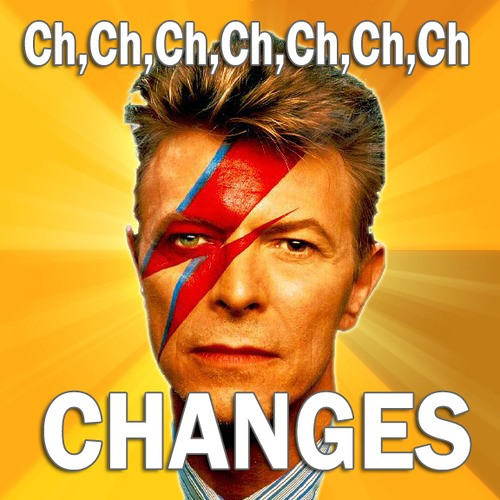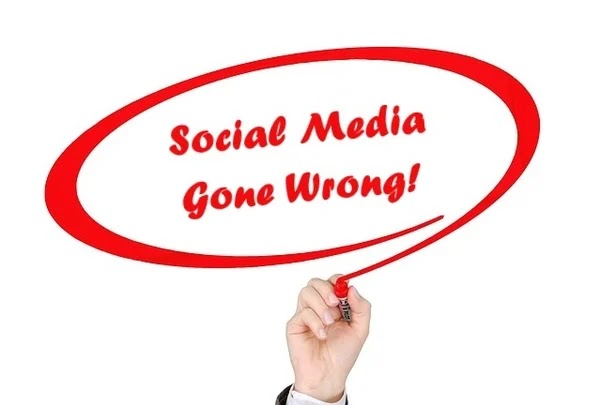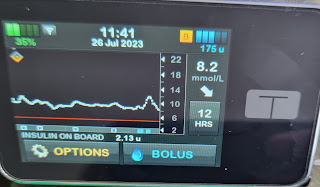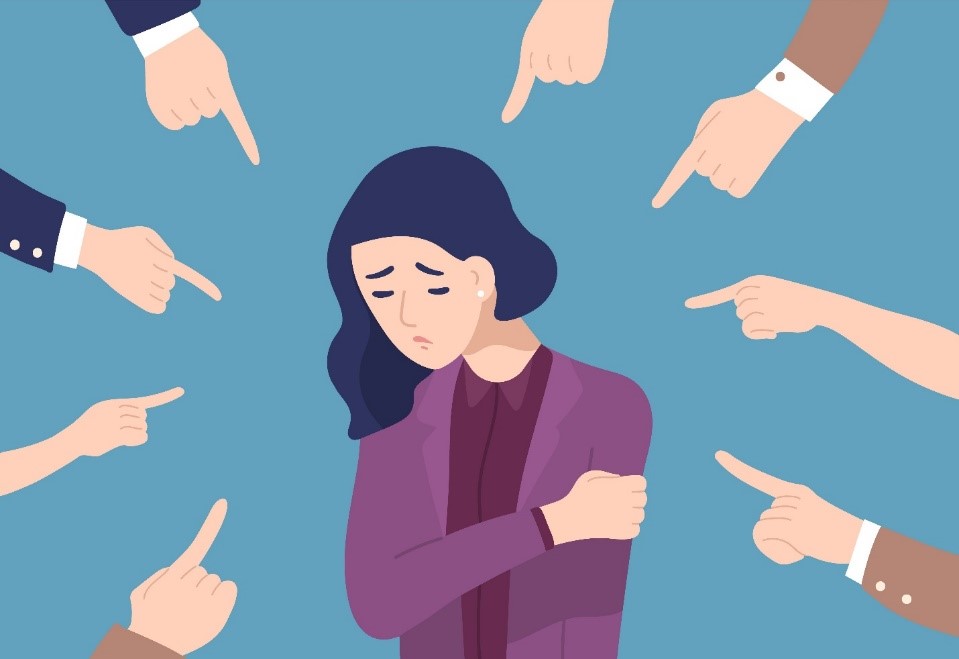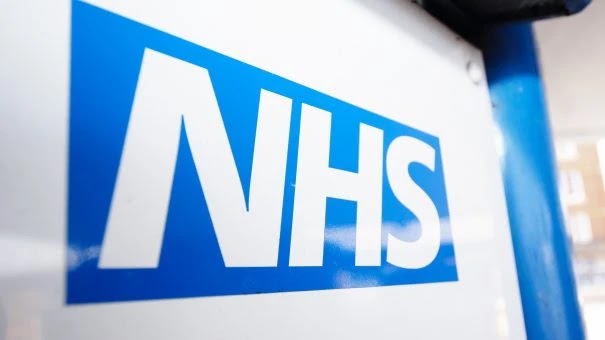Sunday, June 30, 2024
Changes
Saturday, November 18, 2023
Let The Storm Rage On
...the cold never bothered me anyway? Well, tis (almost) the season for such movies. You might have realised from the image above that this isn't a blog post about Frozen or Christmas Instead, I'd like to talk about everyone's favourite subject; social media. Gah! I know quite a lot of you are now going to close this window, unfollow me, throw away your phone and report me to the police. I might deserve some of that! I mean, have you READ my tweets?! Jeez!
For the handful of you who remain, let's get into it. Sometimes, I "do a lot of socials" and not just for myself. From time to time, I work for others (volunteered and paid roles) alongside my own blathering. It's cool, I like the interactions and social media has opened a world of experiences for me. It's helped my health, too. My T1D is unrecognisable from what it used to be just 6 or 7 years ago. That's an incredible thing if you really consider it. It also paints the general population in a great light, especially diabetics, as they are the driving force behind my current diabetes management and stable health.
I've thanked the online diabetes community in several blog posts and posts on socials. They truly are a great bunch and if you're new to that world, embrace it and soak up all the info and support that you need. In other posts, I've issued warnings to people to be cautious online. Despite the majority of people having no agenda but to assist others and gain their own support, there will always be a minority who are looking for something else. What are those things? The list is likely long, but you can probably include; using others for profits, career progression, gratification, and self promotion. I've experienced those things and more. Perhaps you have, too. Whilst that's sad, particularly as the diabetes world is focused around health, it's not very surprising. This is the Internet, of course!
Part of the online diabetes community is GBDoc. You're probably aware of it if you stumbled upon this post via a link on one of my socials. I've had a lot of involvement in that community and, again, it's been tremendous. When I began tweeting about diabetes, I was very determined to not involve myself with any community or organisation. That probably lasted about a month! and after a year or so, I was asked to be a volunteer along with several others. Volunteers have come and gone in the last 5 years. They had their reasons and their departures didn't affect me. We remained friends, largely, and some are still kicking around on socials today.
And now it's my turn to depart.
I've simply lost the motivation to continue to freely give my time to GBDoc. There are reasons for that and there are absolutely a select group of people who are behind those reasons. To detail each would result in a very long blog post and it would probably create an online inferno. My own personal attacks have included accusations of stigmatising others, subversive posts that target others, discriminating against others who are not British, not fact-checking things I retweet (because I'm CNN, obviously)... and I'm going to stop there because even as I type those things, and even after some time has passed, I feel affected by those accusations and the shocking levels of entitlement to tell me how I run my own personal account. I'm not perfect. Indeed, there have been times when I've corrected or removed something I knew to be wrong or even something that could be misinterpreted. Over the years, I've listened to others and made apologies for my own errors and, unnecessarily, the misinterpretations of others. Those instances were on Twitter (now X) which has never really been the easiest place to read tone from or gain much from in the way of great detail - unless you have a verified account and you love writing essays, of course!
I'm not looking for sympathy. However, I feel sorry for my friend, Jules. She's well known for living with some serious conditions which are exacerbated by stress. To listen to her breaking and tearful about the whole saga was very tough. The non-apology and the carry-on-regardless nature of those involved was bewildering. "Bewildering" was the best I could muster after deleting various expletives. Of course, you should form your own judgements if you wish, but from someone "on the inside" I know the hurtful remarks made about GBDoc volunteers (managed by Jules) were so far removed from reality. I hope that she'll come back one day. I'm sure the community will continue to thrive in whatever guise.
There is much more I could add to this post. I may follow up at a later date. There will, of course, be more blog posts on other subjects in the days, weeks and months to come. If you're from GBDoc, it's been lovely to volunteer for you since 2018. Stay well.
Wednesday, July 26, 2023
Keep Me In The Loop
BUY DIABETIC DAD A COFFEE HERE
GET MENTORING SUPPORT FROM DIABETIC DAD
Prefer PayPal?
Sunday, July 9, 2023
Combating Stigma in Diabetes Online Content
In today's digital world, the internet has become a significant source of information and support for individuals with chronic conditions such as diabetes. However, despite its many advantages, the online sphere is not immune to the perpetuation of stigma and misinformation surrounding the condition. You may have read a lot about stigma via your social media platforms of late. I apologise if my own content has been focused on that subject. However, I do believe it is a hugely important issue and one which can be addressed within the general population. I understand that to many of you stigma is not the most exciting subject to read about. Indeed, some of you may have never experienced stigmatising content. Stick with me, have a read, it will only take a few minutes.
Stigmatising content can have severe consequences for individuals with diabetes. It not only perpetuates harmful stereotypes but also hinders our ability to manage the condition effectively. Stigma may discourage individuals from seeking necessary medical care, adhering to treatment plans, or even disclosing their condition to others. Consequently, this can lead to poor glycemic control, increased complications, and a diminished quality of life.
To combat stigma effectively, it is crucial to empower individuals with diabetes through education and awareness. Creating and promoting online content that accurately represents the realities of living with diabetes can play a pivotal role in challenging misconceptions and dispelling stereotypes. At #GBDoc, we recently launched the #StopTheStigma campaign to do precisely that. By providing evidence-based information, sharing personal experiences, and embracing empathy towards others, we can reshape the narrative around diabetes and create a more inclusive online environment.
Online communities such as GBDoc can serve as a lifeline for individuals with diabetes, offering support, validation, and a sense of belonging. These communities should prioritise the creation of safe spaces that are free from stigma and judgement. As a volunteer, I work hard to ensure everybody feels safe to engage in and express themselves in the communities that I am a part of. If you notice or experience otherwise, just let me know.
Healthcare professionals CAN play a crucial role in combating stigma surrounding diabetes. By staying updated on the latest research, guidelines, and treatments, they can provide accurate information to their patients and the general public. Sadly, there are some HCPs with a different agenda. I strongly encourage diabetics of any type to avoid engaging with or acknowledging HCPs who are promoting diets or lifestyles via a subscription based service. There are a few of those guys kicking around, even in the UK!
Despite it being 2023 and despite many words of advice and correction, stigma surrounding diabetes persists in online content today, creating barriers for individuals seeking support and information. However, by recognising the impact of stigma and actively working to combat it, we can create a more inclusive and supportive online environment for individuals with diabetes. Through education, empathy, and the promotion of accurate information, we can break down barriers, empower those affected by diabetes, and contribute to everyone's overall well-being.
BUY DIABETIC DAD A COFFEE HERE
GET MENTORING SUPPORT FROM DIABETIC DAD
Prefer PayPal?
Wednesday, April 5, 2023
Diabetes Abuse
Living with diabetes can be a challenging experience, and connecting with others who understand what it’s like can be incredibly beneficial. However, as with any community, there can be issues that arise, including abusive behaviour. Unfortunately, even within the diabetes community, there are people who engage in abusive behaviour towards their fellow diabetics. This can take many forms, from bullying and shaming to outright harassment and intimidation.
It’s important to recognise that abusive behaviour is never acceptable, regardless of who is engaging in it or why. No matter how frustrated or angry someone may be, it is never okay to take that out on another person, especially someone who is dealing with the same struggles that you are. In fact, engaging in abusive behaviour towards other diabetics is particularly harmful because it can undermine the sense of community and support that is so important in managing diabetes.
Here are some of the reasons why it’s essential to not accept abusive behaviour within the diabetes community:
• It undermines the support system
One of the most significant benefits of the diabetes community is the sense of support and understanding that it provides. When you connect with other diabetics, you can share your experiences, exchange advice and tips, and find comfort in the fact that you are not alone. However, when abusive behaviour is present, it can erode that sense of support and understanding.
People who are subjected to abuse may feel isolated and alone, as if they have no one to turn to who will understand what they are going through. This can make it more challenging to manage diabetes, as the support that they would usually rely on is no longer available. It’s essential to create a safe and supportive environment within the diabetes community to ensure that everyone feels comfortable seeking and offering support.
• It can have negative mental health consequences
Abusive behaviour can have a significant impact on mental health. For people with diabetes, who already have to manage the stress and anxiety that comes with living with a chronic condition, this can be especially harmful. Abuse can lead to feelings of shame, guilt, and worthlessness, which can exacerbate existing mental health issues or even lead to the development of new ones.
It’s crucial to prioritise mental health within the diabetes community, and that means not accepting abusive behaviour. People with diabetes need a supportive environment where they can feel safe discussing their struggles and seeking help when they need it. If abusive behaviour is present, it can make people feel even more isolated and alone, which can be detrimental to their mental health.
• It perpetuates harmful stereotypes
Unfortunately, there are still many harmful stereotypes and misconceptions about diabetes. Some people believe that diabetes is a result of poor lifestyle choices, and that people with diabetes are lazy, unmotivated, or lacking in willpower. These stereotypes are not only untrue, but they are also harmful and can contribute to the stigma that people with diabetes face.
When people within the diabetes community engage in abusive behaviour, they are perpetuating these harmful stereotypes. By shaming or bullying other diabetics, they are essentially saying that they believe these stereotypes are true, and that people who struggle with diabetes are somehow to blame for their condition. This can be incredibly damaging, both to the individual who is being targeted and to the community as a whole.
• It creates an unsafe environment
Abusive behaviour can create an unsafe environment within the diabetes community. People who are subjected to abuse may feel uncomfortable attending diabetes-related events or engaging with others in the community. They may feel that they are at risk of being targeted again, and that they have no recourse if that happens.
Creating a safe environment within the diabetes community means ensuring that everyone feels comfortable and supported. No one should feel as though they are at risk of being targeted or harassed. When abusive behaviour is present, it can undermine that sense of safety within the community.
If you enjoyed this blog and you'd like to support me over the time that I give to others then check out these links:
BUY DIABETIC DAD A COFFEE HERE
GET MENTORING SUPPORT FROM DIABETIC DAD
Prefer PayPal?
Friday, March 10, 2023
The Importance of Diabetes Community
Away from being bestie mates with lots of new people, your diabetes could benefit hugely from community engagement. Hybrid Closed Loop (not an artificial pancreas) looks likely to be a hot topic for the years ahead in the UK. Yet, most diabetics are not using that technology right now. That means a lot of learning and understanding is on the horizon for people who may want to try HCL (criteria dependant, naturally). The same was true of Libre, CGMs, Smart Pens and Insulin Pumps - less complex than HCL, perhaps, but the usage experiences of peers have proved invaluable to many.
So, you've got new friends and new tech. Now what? Maybe you struggle with the mental burden of having diabetes? Maybe you've heard of talking therapy? That's exactly what a community can offer. Put your grown up pants on and start talking, tweeting, posting, whatever! You'll be surprised at who understands your issues and reaches out to offer an ear. And it helps! To not feel alone in your struggles can ease your burden even if no immediate solution is found. What is the old saying about a problem shared is a problem halved?
Do you need more? Well, community doesn't always mean serious. I've had some hugely fun days out with my friends from GBDoc, we play quizzes, fantasy football and cruel but funny practical jokes on each other! Other skills are shared via a Stitch Club. Books are read at the same time, films and TV shows via watch-a-longs, hobbies and interests shared and enhanced because of new diabetic friends who just enjoy the same things. Maybe you enjoy gaming? gotcha! Art? gotcha! The list of interests is huge and you'll likely find someone who enjoys the things that you do with no relevance to diabetes apart from being in the wonky pancreas gang.
By the way, serious can also be lovely. Some friendships have developed into more and dating, even marriage, has happened.
If life dealt you a bad hand with diabetes, you can still win the pot if you play your cards right. I'm turning into Bruce Forsyth. Good blog, good blog.
Thursday, November 17, 2022
The Six Principles of Good Peer Support - My Thoughts
1. Driven by the shared experiences of people living with Type 1 Diabetes
Why is this important?
The value of good peer support comes from people sharing their experiences, frustrations and successes with others who have been through similar things themselves.
Straight in there with shared experiences. Great stuff. Many of us love to share but also to learn from the experiences of others. I think it's important to remember that, despite T1D, we are all very different in many ways. A review of a CGM or a pump can be completely different from person to person, a visit to a certain clinic, reactions to certain meds, diets, exercise. It's very obvious that there is little in the way of black and white when it comes to T1D. Taking on board the words of others and their experiences can absolutely prepare a person, give them a heads up, etc but don't always take a shared experience as gospel.
What does this mean for:
People with Type 1 diabetes accessing and giving group support as a group member?
People can share real-world examples of how living with Type 1 diabetes affects them. They can find reassurance and support from other people in the group who know what it’s like to live with the condition.
Absolutely. How often do you read "Hard relate" when somebody shares an experience? Very often, for me.
People giving Type 1 diabetes peer support as a group leader/facilitator?
Facilitators being able to share their own experiences with confidence will help and encourage others to do the same, whilst being mindful that each person’s own experience is unique.
Mindful indeed. I'm pleased that this was added in Principle 1. Peer support cannot be "Do it this way because it works for me". Well done to whoever pushed that in.
Clinicians and service providers?
Referring people to a group of ‘experts by experience’ will provide a vital avenue for people to feel confident and supported in living with Type 1 diabetes.
I'm not comfortable with 'experts'. We might be! about our own T1D but about living with T1D in general? By all means, refer to yourself as an expert if you're happy with that. I think the word might also set high expectations from the newly diagnosed or those looking for a specific type of support. Peer support is largely voluntary and it might be very respectful to refer to us volunteers as experts but, I worry about expectations and disappointment. Clinicians could refer people to 'Experienced people living with T1D' and if specific support is needed? '...T1D and a related issue'. I run a T1D group for men, that might look like '...T1D and men's health'
2. Reciprocal, with opportunities for people to ‘give and get’, as well as to learn from one another
Why is this important?
Reciprocal support recognises the mutual benefit of giving and receiving support
What does this mean for:
People with Type 1 diabetes accessing and giving group support as a group member?
All experiences of living with Type 1 diabetes are valid and no one person is more ‘expert’ than another. It would be helpful for group members to understand the difference between information and advice.
Fabulous. Nobody is more important than another in peer support circles. Ugh "expert". No one person's experiences are more valid than another? Great, RE: info and advice. Do the signposting thing and the "My experience of that is..." thing.
People giving Type 1 diabetes peer support as a group leader/facilitator?
The reciprocity of peer support emphasises the importance of creating a flexible space for people to share their experiences and from people to ‘give and get’ from one another. It is recommended that Facilitators have confidence in leading groups, including the ability to manage group dynamics and potentially difficult discussions.
Absolutely right. The GBDoc Twitter accounts often throw up issues and decision making which sometimes needs much discussion. To lead or facilitate requires a skill set that some don't possess. A track record is vital to good (and safe) peer support groups.
Clinicians and service providers?
Confidence that people are being referred to an evidence-based, overarching experience that gives meaning and purpose.
A good track record? Cool.
3. Safe and encouraging, enabling people to share their experiences free from any judgement
Why is this important?
Peer support should provide people with a safe, non-judgmental environment to be able to talk about their experiences of Type 1 diabetes.
What does this mean for:
People with Type 1 diabetes accessing and giving group support as a group member?
In listening to others’ experiences and building trust and confidence in the peer support group, people should feel safe to share their own experience of living with Type 1 diabetes. All group members may contribute to and agree common ground rules and boundaries (for example confidentiality) that will enable this trust to be built.
Essential and well done to whoever pushed this through.
People giving Type 1 diabetes peer support as a group leader/facilitator?
Peer supporters should create the right conditions for a safe, nurturing, and welcoming environment, enabling and encouraging people living with Type 1 diabetes to share their own experiences and to learn from others. Group leaders might want to be aware of the benefit of establishing ground rules and/or a group agreement.
Absolutely right. In my own groups, we vet private group members before acceptance. In the open groups such as the GBDoc Twitter accounts, volunteers will discuss decisions to keep people safe and share information about anything which might put someone or a group of people at risk.
Clinicians and service providers?
Confidence in referring people with Type 1 diabetes to a safe and supportive peer support group.
A good track record of protecting peers? Cool!
4. Accessible and inclusive, available to everyone with Type 1 diabetes
Why is this important?
Everyone with Type 1 diabetes should have equal access to peer support.
What does this mean for:
People with Type 1 diabetes accessing and giving group support as a group member?
People can feel confident that they can access their choice of peer support group.
People giving Type 1 diabetes peer support as a group leader/facilitator?
Clear thought should be given to what would make groups accessible and inclusive e.g. the appropriate language for health literature, physical accessibility and/or cultural or religious considerations.
Barriers that might prevent people from accessing support should be mitigated wherever possible.
It is unlikely that any one group or avenue of support will be able to meet the needs of large groups of people, so knowing about and being able to signpost alternative avenues of support is useful.
I agree about unlikely but it is massively important to TRY. GBDoc has an Accessibility Pledge to cover very basic things in terms of accessibility such as ALT text (image descriptions) and disability friendly venues for get togethers. It is incredible to still see that many accounts of communities and their leaders/facilitators do not consider this. It has taken a lot of work from me to get the major diabetes charities on board with ALT text. I don't have high hopes for some volunteer led communities which offer peer support, sadly. That said, again, well done to whoever pushed through this very important aspect.
Clinicians and service providers?
Confidence in referring people to an accessible and inclusive peer support group.
Please check this before referring. Imagine referring somebody living with visual impairments to an account which does not ALT text their images?
4. Person-centred, taking account of each person’s own strengths, values, needs and feelings
Why is this important?
Peer support should be focused on each person, their own unique characteristics, and what matters to them.
What does this mean for:
People with Type 1 diabetes accessing and giving group support as a group member?
People with Type 1 diabetes are seen as a whole person in the context of their own lives and experiences. Good peer support can help people to understand where their existing strengths and assets lie and how they can draw on these to help them manage their day to day lives.
People giving Type 1 diabetes peer support as a group leader/facilitator?
Good listening skills are implicit in supporting someone to identify their own skills and resources, as well as what is available to them in the community. Good peer support looks outside the peer support group itself to signpost effectively to other services, which meet the needs of each person in the group.
Perfect. Listen to your peers and the language they use, I guess? Send them to the right resources or another group if need be.
Clinicians and service providers?
Confidence that people are being supported to develop their knowledge, skills and confidence to support their Type 1 Diabetes.
5. Complementary, working hand in hand with health and social care providers
Why is this important?
Good peer support should run alongside existing health and social care provision, enabling holistic provision of services to suit each individual person’s needs.
What does this mean for:
People with Type 1 diabetes accessing and giving group support as a group member?
Good peer support is one component in a complete toolkit of care. It provides options, opportunities, and choice for people to live well with Type 1 diabetes.
People giving Type 1 diabetes peer support as a group leader/facilitator?
Working in a complementary way means that people will be encouraged to access a range of services that best meet their needs. It recognises that peer support is only one aspect of Type 1 diabetes management.
Absolutely perfect.
Clinicians and service providers?
Confidence in referring to a peer support group to complement the service that they are providing.
-------
To read the full document then tap/click here
Sunday, November 13, 2022
Peers
BUY DIABETIC DAD A COFFEE HERE
Prefer PayPal?
